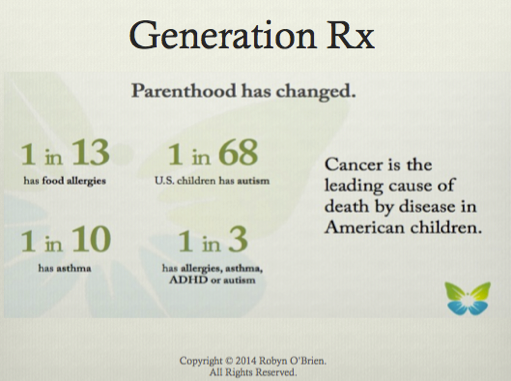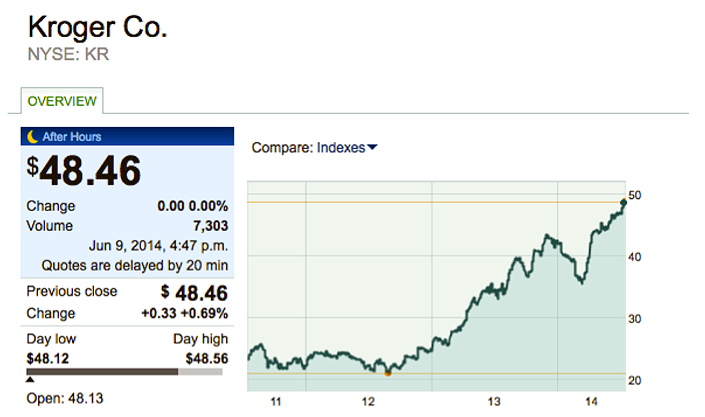
by guest blogger Robyn O’Brien, author and former financial and food-industry analyst
The Grocery Manufacturers Association is the voice of more than 300 leading food, beverage, and consumer-product companies, but is it a relic of the 20th century?
Questions that are starting to pop up about the Grocery Manufacturers Association include: Is it still delivering value to its members? And would members be better served by forming a new organization—let’s just hypothetically call it the Food Production Association—to meet the needs of companies in the 21st century?
Founded in 1908, the Grocery Manufacturers Association (GMA) is a self-described active, vocal advocate for its member companies and a trusted source of information about the industry and the products consumers rely on.
But do 21st-century consumers actually turn to this organization today? And is it truly an advocate for its members?
The organization’s website states: “A vital role of GMA is to serve as a central resource for our members, providing industry model practices and a means for collaboration between members, retailers and service providers on important challenges and opportunities facing the industry.” The organization may have done that 20 years ago, but is it still doing that today? Is it doing so when it files suit against Vermont to overturn its mandatory GMO-labeling law?
The landscape of health has changed, and it’s changing the landscape of food. Today, the rate of diabetes is skyrocketing, 1 in 4 children has a chronic condition, 1 in 13 children has a food allergy, 1 in 10 has asthma, and 1 in 68 has autism, with cancer now being the leading cause of death by disease in American children. The rates of these conditions are escalating, and parents are reading labels.

Did any of us expect motherhood or fatherhood to look like this? No one would choose autism, life-threatening food allergies, or cancer. But we find ourselves face-to-face with these conditions every day. It’s changing so many aspects of our lives, and it’s changing how we approach the grocery store.
Some companies want to spend millions of dollars debating how we got here. Parents don’t have time. Their hands are tied managing daily life and various health conditions. CNN/TIME reported that the additional cost of raising a child with food allergies is $4,200/year. Consumers want transparency, and denying us basic information about what’s in the food we’re feeding our loved ones is out of touch.
Over the last year, more than 60 state laws have been introduced to label genetically engineered ingredients in foods. Consumers know about it, companies know about it. Companies inside the GMA are producing product lines without these ingredients, and those product lines are profitable pieces of their portfolio. One look at the success of Kroger’s Simple Truth “free-from” line demonstrates what a brand can do when it removes additives, GMOs, high-fructose corn syrup, and more.
Consumers want “free-from” food. It’s not about debating the “how” or the “why” we got here. It’s about meeting a mother where she stands in the aisle of the grocery store, holding onto a child with diabetes or food allergies or shopping for parent with cancer.
Everyone is recognizing the need for food free of artificial ingredients. Panera Bread recently announced that it is pulling these ingredients from its products, Target’s Simply Balanced has committed to removing genetically engineered ingredients by the end of 2014, and Kroger is seeing record earnings growth with its Simple Truth product line. (The brand went from $0 to $1 billion in revenue in just two years.)

So if companies that are dumping the junk are being rewarded by consumers and the stock market, shareholders, and stakeholders, what purpose does GMA serve by getting in the way of that? Is that in the best interest of its members?
As GMA spends record amounts filing a lawsuit against the state of Vermont which has just taken a big step toward bringing transparency to its food system for its consumers, you have to wonder if this is money well spent for its members. What if instead, these members decided to leave the organization and start another one, one that truly met their needs in the face of changing consumer demand and the changing health of American consumers. Or what if a few got aggressive and filed a “loss of business” lawsuit against the group, given the decline that companies like Kellogg’s are seeing in sales and the resulting employee layoffs as they entrench on the GMO-labeling issue?
21st-century families want free-from food—it isn’t complicated. And shareholders and stakeholders are rewarding the companies that understand this and are delivering products that meet these needs.
They’re not debating the science; they’re not filing lawsuits. They are simply meeting us where we stand: in the aisles of the grocery store shopping for the 1 in 3 American children that now has allergies, asthma, ADHD, or autism. They are building a new food economy, becoming icons for the 21st-century consumer, making GMA look like a relic of the 20th century, and opening the door for another industry organization to form.
Can you imagine if Kroger, Target, and other retailers joined together to form the Food Production Association, whose mission was to build a clean and safe food system and to secure the supply chain for 21st-century families? Instead of channeling member dollars into lawsuits, it could grow the base of U.S. farmland under organic management, so that we don’t outsource this economic opportunity for our companies, farmers, and country to our trading partners.
Imagine an organization for the food industry that actually focused on securing a non-GMO supply chain for American companies, rather than fighting this shift in consumer demand and outsourcing this economic opportunity to China and Romania. Imagine an organization that understands that the rise in cancer, autism, food allergies, and other conditions is not a “trend,” and neither is the demand for transparency. An organization that gives American consumers the right to know whether the Environmental Protection Agency regulates their corn as a pesticide or not—a right that 60 percent of the world’s population has been given already. Imagine that.
It’s food for thought.
 Robyn O’Brien is a former financial analyst who covered the food industry. You can learn more at www.robynobrien.com
Robyn O’Brien is a former financial analyst who covered the food industry. You can learn more at www.robynobrien.com




I wish you could send this article to ALL the members of the GMA, to the CEO’s and the stockholders, etc. If maybe one of them in each company saw the “light”and realized the truth of what you are saying…..maybe they could get the others to agree!! This is the best article I’ve seen in ages about this issue. You are not trying to put them out of business, you are giving them a positive reason to do the Right Thing! Thank you for this great message, I just hope you are able to get it out there, to send it to all the members of the GMA so that they can see a better way to do business….for all of us. This gives me real hope!
I’m surprised you said this sincerely, without irony, “(GMA is) a trusted source of information about the industry and the products consumers rely on.” No informed consumer trusts the GMA. The GMA exists to grow food manufacturers’ profits and share prices. It’s got nothing to do with food. The GMA ignores the healthfulness (or lack thereof) of its members’ food products. We consumers are learning that healthy food consists of fres produce – fruits and vegetables. Fresh meat and fish, grass-fed and wild-caught. Fresh dairy and eggs – again, grass-fed. No boxes, no packages, no processing. In real, nutritious food, there’s no need for “manufacturing”. The idea of manufactured groceries is an oxymoron. There’s no need for Kelloggs, and no need for the GMA. The GMA is the antithesis of food. Good riddance…
Absolutely LOVE LOVE LOVE your article! You are absolutely right…. and it is us Mommies that have got to KEEP FIGHTING for “free from foods”! I’ve mentioned this many timess in different comments, forums and post on both my personal AND facebook group “The Push” page on facebook…. if we ALL just keep teaching everyone we encounter all day everyday in our playgroups, doctor visits, church groups, PTA groups, ect….. we will make it IMPOSSIBLE for these companies to stay in business if they chose to continue pumping GMOs and other “natural flavors” that are nothing but NASTY (arsenic, fish bellies, bever bodily secretions, ect….) Bottom line, yes, this organization needs to either wake up or BE GONE! And we all need to do whatever it takes to help Vermont retain their law!!! It isn’t just their fight … it is ALL of ours…. we all win or loose with them! I live in Florida and I’ve donated mobey to their fund for fighting this…. may not be much but if all of us contributed even $5 or $10 dollars that times thousands of people would be colossal towards helping Vermont fight!!!! n
Perhaps GMA is more a conduit for Monsanto rather than providing services for its member companies . If HMO Labeling wins, Monsanto loses.